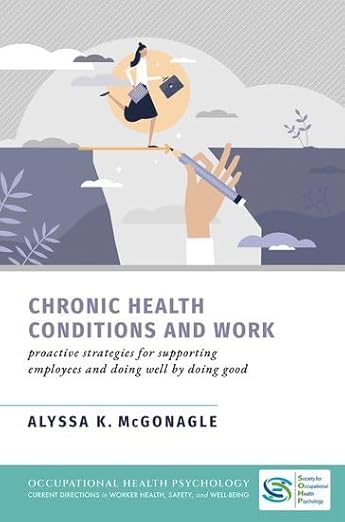New Book Offers Strategies for Managing Chronic Illness in the Workplace for Managers and Employees

A new book by Alyssa K. McGonagle, associate professor of psychology and organizational science, helps guide managers and employees who are navigating the impacts of chronic health conditions in the workplace.
According to a poll from Harvard’s T. H. Chan School of Public Health last year, more than half of U.S. employees have chronic health conditions, with 76 percent needing to manage their conditions during work hours.
The new book on worker health, safety and well-being serves as a handbook for how managers and human resources professionals can best assist employees who are dealing with long-term health challenges. It represents the culmination of 15 years of research and studying McGonagle began as a graduate student at the University of Connecticut.
“Chronic Health Conditions and Work: Proactive Strategies for Supporting Employees and Doing Well by Doing Good” was published by Oxford University Press this summer and debuted on Amazon’s top-25 list for medical occupational and organizational psychology books.
McGonagle says managers at all levels from frontline supervisors to senior leaders could find the book helpful for supporting their employees.
“Everyone managing employees is more than likely managing someone who is dealing with the impact of chronic health conditions as they work — even if they’re not aware of it — because oftentimes employees are hesitant to disclose those issues,” said McGonagle. “Managers often do not get formal training on these important issues, so they may not know how to talk to their employees once they do disclose a condition.”
Compliance with laws and concern over violating regulations are factors as well.

“Leaders may be afraid because they don’t want to break laws around the Americans with Disabilities Act or other rules. They also may be skeptical because they don’t understand chronic illness if it doesn’t affect them personally,” said McGonagle. “There are issues at the organizational level, too, in terms of how they keep the business running and make sure the work gets done, while supporting people in an effective way.”
Employees who are managing chronic health issues while maintaining their employment will find tips and conversation starters for addressing their condition with supervisors and colleagues.
“Employees facing chronic health conditions might find some validation knowing they’re not alone in dealing with some of those challenges,” said McGonagle. “Workers will find tips about what they can ask for from their organizations and how to go about doing that effectively.”
Health challenges can be difficult to address from a social aspect as well; McGonagle’s book addresses the many commonalities employees face.
“Maybe an employee needs accommodations, but is hesitant to disclose the illness to their manager or make that known to people,” said McGonagle. “The decision about disclosure and how much to reveal and talk about it is a common concern with chronic health conditions.”
“The challenge for employees is how to have ongoing conversations with managers and self-advocate,” said McGonagle. “They navigate a balance of being just assertive enough — without crossing any boundaries or over-providing information about an illness to be judicious with their personal health information — while making sure their needs are met.”
Employees may also find themselves dealing with questions or uncomfortable situations from coworkers.
“Experiencing stigma or discrimination either from coworkers who might question whether an illness is real or if time off or accommodations are truly needed — or managers who are unwilling to provide those things — are common challenges,” said McGonagle.
Balancing a chronic health condition with work can impact employees in other ways.
“It’s important to make sure individuals are in a sustainable career. Chronic health conditions may impact their work ability over the long term, so they should take care that they’re not overtaxing themselves trying to keep their job,” said McGonagle. “A lot of people I talk to put everything they have into their jobs so they can continue working, but that’s really to the detriment of their health, personal relationships or family.”
Praise for the book is shared by Steven Rogelberg, Chancellor’s Professor at UNC Charlotte, who is McGonagle’s colleague in the Department of Psychological Science and organizational science doctoral program, and the author of “The Surprising Science of Meetings” and “Glad We Met.”
“Dr. McGonagle is a globally recognized expert on chronic health conditions and the world of work,” said Rogelberg. “She takes her incredible insights and packages them together in a highly compelling manner to bring forward this book that is truly a game changer for organizational leaders at all levels.”